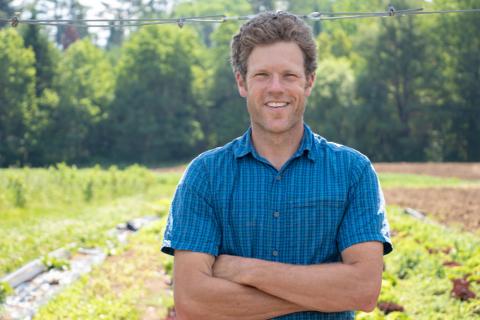
Farming is rewarding, but as most agricultural producers know, the work is challenging. This is especially true for new farmers. Earlier this year, UNH Extension interviewed new and beginning Granite State farmers. In this continuing series of profiles, we share their success stories, challenges, farming tips and hopes for the future of their businesses.
When Sam Brown moved to New Hampshire 16 years ago, he didn’t set out to be a farmer. Education was his field, and he took over the performing arts program for a boarding school in Bethlehem—about as far away from a farm as a person can get.
But then Brown got involved with the school’s small community garden. And after a while, he helped develop a program for students to learn more about farming and sustainable agriculture. That’s when he started thinking about changing course. “All along, I had been thinking more about the food I was eating and where it was coming from,” Brown says.
Nearby, Meadowstone Farm was looking for someone to work at the farm full-time. Brown was hired—and now, 10 years later, is the farm’s manager.
“One of the things I love about my job here is it varies from day to day,” Brown says.
"I can see myself making a big impact in other ways with agriculture."
Meadowstone is a diverse operation with a variety of crops and pastured animals. Visit the farm on a given day and you’ll likely find Brown milking goats, tending to cows, managing the latest harvest or planning a field rotation. It’s a complex operation, but a diverse farm economy is a benefit, according to Brown. And, it’s as self-sufficient as possible. Food waste becomes either animal food or compost. Animal bedding also becomes compost, and all that compost ends up back in the fields, where it’s used for the next set of crops.
Though Brown spends his days working the farm, he still considers himself an educator. But now, the farm is his classroom and the farm’s visitors his students. For Brown, farming is about reaching out, forming partnerships and growing a community. Four years ago, Brown worked with UNH Extension’s Heidi Barker and Ed King of the Littleton Food Coop to make it easier for shoppers to use SNAP benefits at the Littleton Farmers Market through the Granite State Market Match program.

“I’ve always appreciated helping kids learn about life,” he says. “But I can see myself making a big impact in other ways with agriculture: Growing food and providing it to the local community, educating people about their food and where it’s coming from and promoting a healthy lifestyle.”


